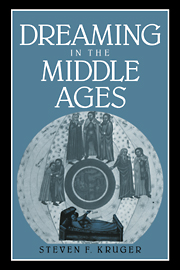Book contents
- Frontmatter
- Contents
- Acknowledgments
- List of abbreviations
- Introduction: modern and medieval dreams
- 1 Dreambooks and their audiences
- 2 The doubleness and middleness of dreams
- 3 The patristic dream
- 4 From the fourth to the twelfth century
- 5 Aristotle and the late-medieval dream
- 6 Dreams and fiction
- 7 Dreams and life
- Notes
- Bibliography
- Index
4 - From the fourth to the twelfth century
Published online by Cambridge University Press: 22 August 2009
- Frontmatter
- Contents
- Acknowledgments
- List of abbreviations
- Introduction: modern and medieval dreams
- 1 Dreambooks and their audiences
- 2 The doubleness and middleness of dreams
- 3 The patristic dream
- 4 From the fourth to the twelfth century
- 5 Aristotle and the late-medieval dream
- 6 Dreams and fiction
- 7 Dreams and life
- Notes
- Bibliography
- Index
Summary
CHAUCER AND PRUDENTIUS
Geoffrey Chaucer's House of Fame begins with a comic discussion of dreams that raises many of the questions addressed by late-antique authorities. The poem's narrator presents dreams as sometimes reliable, sometimes not: “th'effect folweth of somme, / And of somme hit shal never come” (lines 5–6). And asking repeatedly what might cause dreams, he lists a variety of familiar possibilities: dreams can arise from the physical and psychological condition of the dreamer (like Macrobius's insomnium) (21–40), from the action of external “spirites” (like Gregory's reuelationes and inlusiones) (41–42), or from the natural motion of the “parfit” soul (like Calcidius's uisum) (43–51).
But while Chaucer's narrator demonstrates a wide knowledge of dream theory, he consistently refuses to acknowledge his own learnedness, asserting instead a confused ignorance (12, 14–15, and 52) and deferring to the superior knowledge of others (“grete clerkys,” 53). He refuses to organize dream lore into any coherent system, refuses to become a theorist. While echoing authoritative treatments of the dream, Chaucer points up – in his narrator's repeated confusions – the problems that such complex treatments pose for the particular dreamer attempting to deal practically with his own “wonderful” (62) dreams.
The response here to the complex potential of dreams strongly recalls Prudentius's “Hymnus ante somnum.” The speaker of that poem, reacting to the dream's variousness and possible hidden dangers, does not try to codify or contain dreaming within a systematic theory.
- Type
- Chapter
- Information
- Dreaming in the Middle Ages , pp. 57 - 82Publisher: Cambridge University PressPrint publication year: 1992



